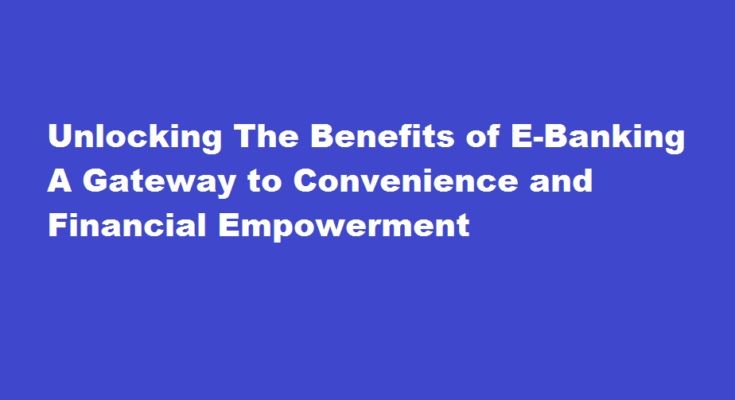Introduction
In the digital era, traditional banking is transforming rapidly, making way for a more accessible and efficient alternative: e-banking. E-banking, also known as online banking or electronic banking, offers a multitude of benefits that can revolutionize the way we manage our finances. From convenience and cost-effectiveness to enhanced security and financial empowerment, this article explores how e-banking has become an indispensable tool for individuals and businesses alike.
Unparalleled Convenience
E-banking eliminates the need for physical visits to a brick-and-mortar bank, allowing users to perform a wide range of financial transactions from the comfort of their homes or offices. Whether it’s checking account balances, transferring funds, paying bills, or managing investments, e-banking offers a one-stop platform accessible 24/7. This convenience saves valuable time and eliminates the constraints of traditional banking hours. Additionally, e-banking enables users to access their accounts from anywhere in the world, providing unparalleled flexibility for frequent travelers or those living in remote areas.
Cost-Effectiveness
E-banking significantly reduces or eliminates many of the fees associated with traditional banking services. Online transactions are often free or have lower charges compared to physical branches. Furthermore, e-statements replace the need for paper-based statements, reducing environmental impact and cutting costs for both banks and customers. By avoiding travel expenses and reducing paperwork, e-banking can contribute to significant savings in the long run, making it an attractive option for cost-conscious individuals and businesses.
Enhanced Security
Contrary to common misconceptions, e-banking offers robust security measures to safeguard users’ financial information. Banks employ encryption technologies, firewalls, and multi-factor authentication to protect transactions and customer data from unauthorized access. Regular security updates and alerts ensure that users are aware of any potential risks. In fact, e-banking can be safer than traditional banking methods, as physical documents and cash are susceptible to theft or loss. Additionally, digital records allow for quick dispute resolution and fraud detection, further enhancing customer confidence in the system.
Greater Financial Empowerment
E-banking empowers individuals to take control of their finances. Online banking platforms provide detailed transaction histories, personalized budgeting tools, and interactive financial dashboards that allow users to track their expenses, set savings goals, and make informed financial decisions. Real-time updates and notifications keep users updated on their account balances, helping them stay on top of their financial health. Moreover, e-banking offers easy access to a wide range of financial products and services, including loans, investments, and insurance, providing individuals with opportunities to grow and diversify their wealth.
Frequently Asked Questions
What are the essential factors determining use of e-banking?
These factors include useful- ness, convenience, security, design, trust, quality, and value.
What is the impact of e-banking in the banking sector?
E- Banking is playing a major role in improving the service quality and strengthening the banking sector because of the electronic payment there is increase in customer satisfaction level, increased productivity, reduction in cost of banking operations, settlement faster and in large volumes.
Conclusion
E-banking has revolutionized the financial landscape, offering a myriad of benefits to individuals and businesses. Its unparalleled convenience allows users to perform transactions anytime, anywhere, while the cost-effectiveness of online banking reduces fees and saves money. Enhanced security measures ensure the protection of financial information and offer peace of mind. Moreover, e-banking promotes financial empowerment by providing comprehensive tools and resources to manage and grow personal finances effectively. As technology continues to advance, e-banking is expected to become even more sophisticated, offering new features and services that cater to the evolving needs of customers. Embracing e-banking is not just a trend; it is a smart choice for those seeking convenience, efficiency, and financial empowerment in today’s digital age.
Read Also : Understanding The Distinction Private Company vs. Public Company



